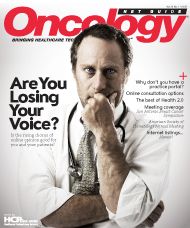Publication
Article
ONCNG Oncology
Influential Online Communities
Author(s):
As we begin 2009, I am struck by how radically different the Internet looks and acts today compared to just 10 years ago.
As we begin 2009, I am struck by how radically different the Internet looks and acts today compared to just 10 years ago. One of the biggest changes since 1999 is that there are many new ways to interact with peers and consume realtime information about products and services.
Today, people are merging their business and personal activities through the Internet. It’s easy to go from a personal banking site, to Google search results, to sites that review and provide uncensored comments about products, healthcare, politics, and just about anything else. E-mail is another area where business and personal activities tend to blur. In the 1990s, business applications like Microsoft Office (with Word, Excel, and Outlook) migrated from the office to the home. Today, Web 2.0 technologies like video sharing, blogging, and social networking are migrating in the opposite direction, from the home to the office. The result is a much less distinct line between work and home life.
Nowhere does the line between business and personal existence become blurrier than on the message boards of online user groups. These communities have a large and growing influence over everything from purchasing decisions to best practices to discussing personal and professional issues. For example, my EHR website has a user board that is active with a wide array of both business and personal discussions. This uncensored bulletin board for Amazing Charts’ users is a place where folks from around the country and world can meet, ask, inform, and share their opinions. At last check, there are 1,330 “members” who have posted 11,428 messages on 1,347 Topics.
Looking at some of the more recent posts, the topics range from someone asking how to view a .PDF file using the program to someone comparing Amazing Charts with eClinicalWorks and e-MDs who wants to solicit opinions from users. Yet another person wrote an editorial-style post called “The War on Physicians,” which generated 147 responses in just one week.
This form of interaction—not only between company and customer, but also between customers themselves—is an example of the real-time feedback and dialog one can generate nowadays because of the broadband connectivity made possible by the Internet. Students who use MySpace and FaceBook are graduating from medical schools with a strong sense of this online community, as well as the skills to leverage message boards to explore life and work problems and discover new products and services that can enhance their lives personally and professionally.
Bulletin boards, message boards, forums, and blogs—no matter what the name—offer a way to compare notes with and get opinions from people who are concerned with similar issues and problems. There are community websites for just about everything imaginable. There are boards discussing the car you drive, the software you use, the foods you eat, the activities you enjoy, even the sexual fantasies you imagine (see my other website AfraidToAsk.com’s bulletin board). And although by their very nature they are biased to the opinions of those contributing, they provide a refreshingly candid and non-commercial forum for discussion. One can only imagine what it will be like in 2019…
How have new interactive online technologies affected the practice of medicine? Are online patient communities a good thing, or are you concerned about their growing infl uence? What about message boards, forums and other online communities for physicians? Do you participate in any of them? If so, do you discuss clinical topics and other professional matters, or do you tend to talk more about nonmedical subjects? Tell us about it.
Dr. Bertman is Physician Editor-in-Chief of MDNG: Primary Care/Cardiology Edition. He is also a Clinical Assistant Professor of Family Medicine at Brown University and president of AmazingCharts. com, a leading developer of electronic health record (EHR) software. He also is the founder and president of AfraidToAsk.com, a consumer website focusing on personal medical topics. He is in private practice in Hope Valley, RI.
